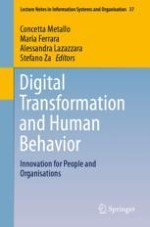2021 | OriginalPaper | Buchkapitel
Bedazzled by Technology
verfasst von : Ivanin Ivanov, Peter Bednar, Athanasios Paraskelidis
Erschienen in: Digital Transformation and Human Behavior
Aktivieren Sie unsere intelligente Suche, um passende Fachinhalte oder Patente zu finden.
Wählen Sie Textabschnitte aus um mit Künstlicher Intelligenz passenden Patente zu finden. powered by
Markieren Sie Textabschnitte, um KI-gestützt weitere passende Inhalte zu finden. powered by
